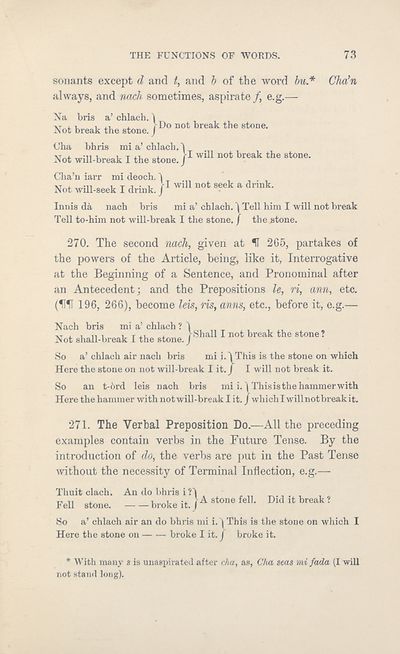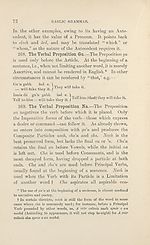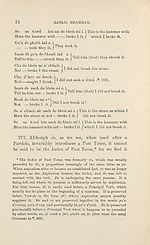Download files
Complete book:
Individual page:
Thumbnail gallery: Grid view | List view

THE FUNCTIONS OF WORDS.
73
sonants except d and t, and b of the word bu* Cha’n
always, and mch sometimes, aspirate /, e.g.—
Na bris a’ chlach. I
Not break the stone. }Do not break the stone-
Cba bhris mi a’ chlach. t
Not will-break I the stone.)1 wil1 not break the stone-
Cha’n iarr mi deoch. 1
Not will-seek I drink, j1 wil1 not seek a dr,nk'
Innis da nach bris mi a’chlach. t Tell him I will not break
Tell to-him not will-break I the stone. / the stone.
270. The second nach, given at IT 2G5, partakes of
the powers of the Article, being, like it, Interrogative
at the Beginning of a Sentence, and Pronominal after
an Antecedent; and the Prepositions le, ri, ann, etc.
(WI 196, 266), become leis, ris, anns, etc., before it, e.g.—
Nach bris mi a’ chlach
XT . , „ i i t j-i i Shall I not break the stone ?
Not shall-break I the stone. J
So a’ chlach air nach bris mi i. 1 This is the stone on which
Here the stone on not will-break I it. / I will not break it.
So an t-6rd leis nach bris mi hlThisisthe hammer with
Here the hammer with not will -break lit./ which I will not break it.
271. The Verbal Preposition Do.—All the preceding
examples contain verbs in the Future Tense. By the
introduction of do, the verbs are put in the Past Tense
without the necessity of Terminal Inflection, e.g.—
Thuit clach. An do bhris i
> A stone fell. Did it break ?
Fell stone. broke it. |
So a’ chlach air an do bhris mi i.) This is the stone on which I
Here the stone on broke I it. / broke it.
* With many s is unaspirated after cha, as, Cha seas mi fada (I will
not stand long).
73
sonants except d and t, and b of the word bu* Cha’n
always, and mch sometimes, aspirate /, e.g.—
Na bris a’ chlach. I
Not break the stone. }Do not break the stone-
Cba bhris mi a’ chlach. t
Not will-break I the stone.)1 wil1 not break the stone-
Cha’n iarr mi deoch. 1
Not will-seek I drink, j1 wil1 not seek a dr,nk'
Innis da nach bris mi a’chlach. t Tell him I will not break
Tell to-him not will-break I the stone. / the stone.
270. The second nach, given at IT 2G5, partakes of
the powers of the Article, being, like it, Interrogative
at the Beginning of a Sentence, and Pronominal after
an Antecedent; and the Prepositions le, ri, ann, etc.
(WI 196, 266), become leis, ris, anns, etc., before it, e.g.—
Nach bris mi a’ chlach
XT . , „ i i t j-i i Shall I not break the stone ?
Not shall-break I the stone. J
So a’ chlach air nach bris mi i. 1 This is the stone on which
Here the stone on not will-break I it. / I will not break it.
So an t-6rd leis nach bris mi hlThisisthe hammer with
Here the hammer with not will -break lit./ which I will not break it.
271. The Verbal Preposition Do.—All the preceding
examples contain verbs in the Future Tense. By the
introduction of do, the verbs are put in the Past Tense
without the necessity of Terminal Inflection, e.g.—
Thuit clach. An do bhris i
> A stone fell. Did it break ?
Fell stone. broke it. |
So a’ chlach air an do bhris mi i.) This is the stone on which I
Here the stone on broke I it. / broke it.
* With many s is unaspirated after cha, as, Cha seas mi fada (I will
not stand long).
Set display mode to:
![]() Universal Viewer |
Universal Viewer | ![]() Mirador |
Large image | Transcription
Mirador |
Large image | Transcription
| An Comunn Gàidhealach > An Comunn Gàidhealach Publications > Scottish Gaelic as a specific subject > (77) |
|---|
| Permanent URL | https://digital.nls.uk/125955941 |
|---|
| Description | This contains items published by An Comunn, which are not specifically Mòd-related. It includes journals, annual reports and corporate documents, policy statements, educational resources and published plays and literature. It is arranged alphabetically by title. |
|---|
| Description | A collection of over 400 items published by An Comunn Gàidhealach, the organisation which promotes Gaelic language and culture and organises the Royal National Mòd. Dating from 1891 up to the present day, the collection includes journals and newspapers, annual reports, educational materials, national Mòd programmes, published Mòd literature and music. |
|---|---|
| Additional NLS resources: |
|

